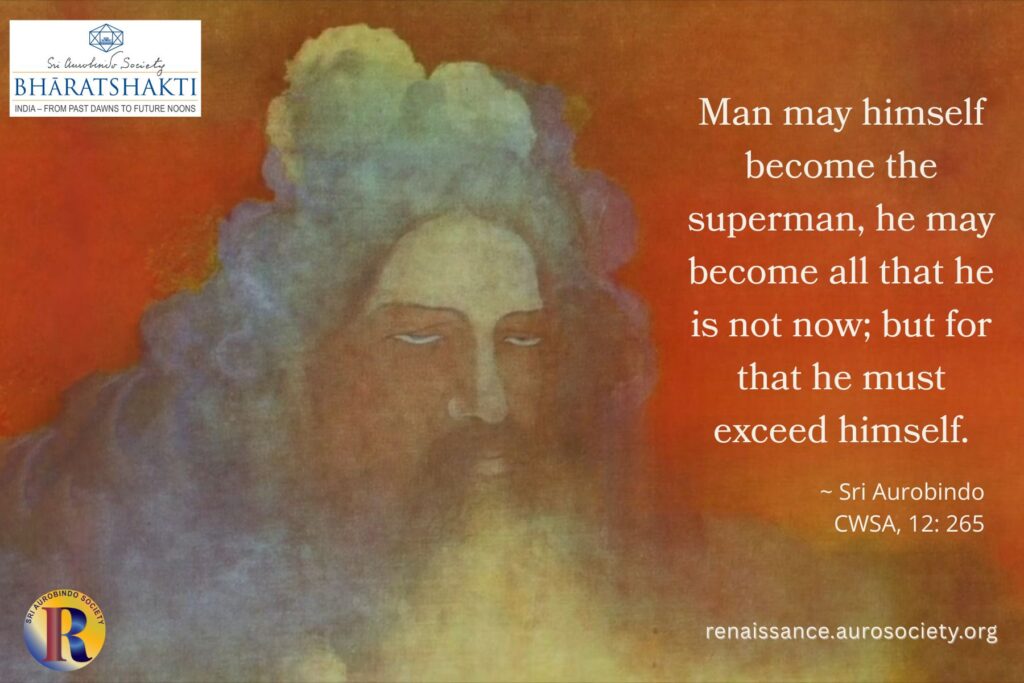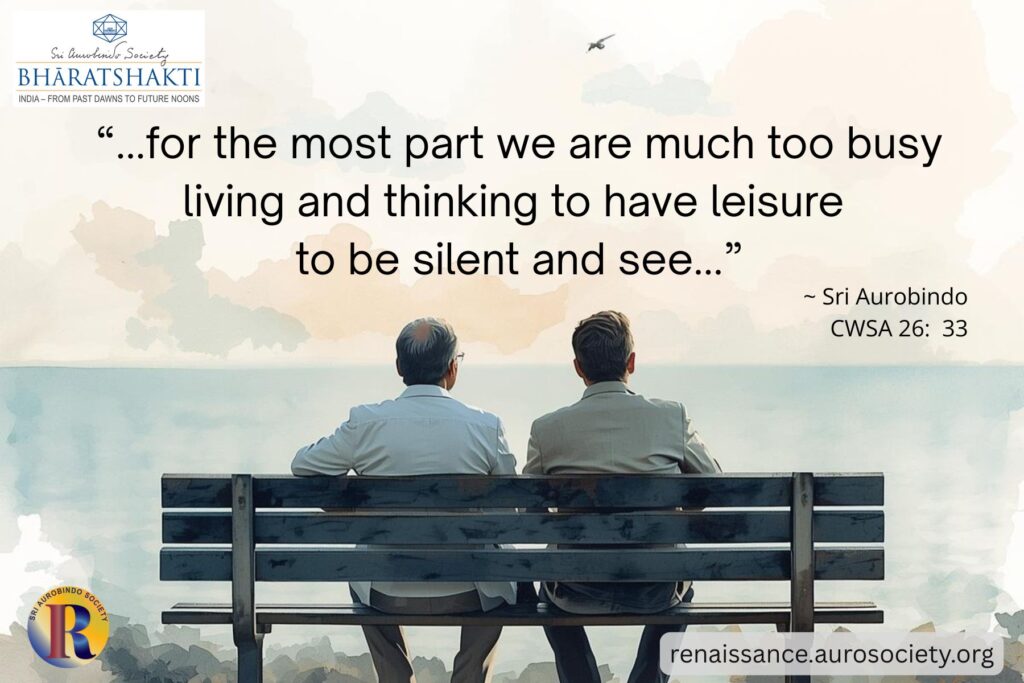Editor’s note: Divyanshi Chugh reminds that different motivations, inner attitudes and aspirations drive individuals to take up work at different stages in their evolutionary journey. She speaks of five stages with ‘Work as Worship’ as the highest stage. She offers to the readers twelve questions reflecting upon which one can grow in self-awareness and rekindle one’s aspiration to do work as worship.

Five Stages of Work
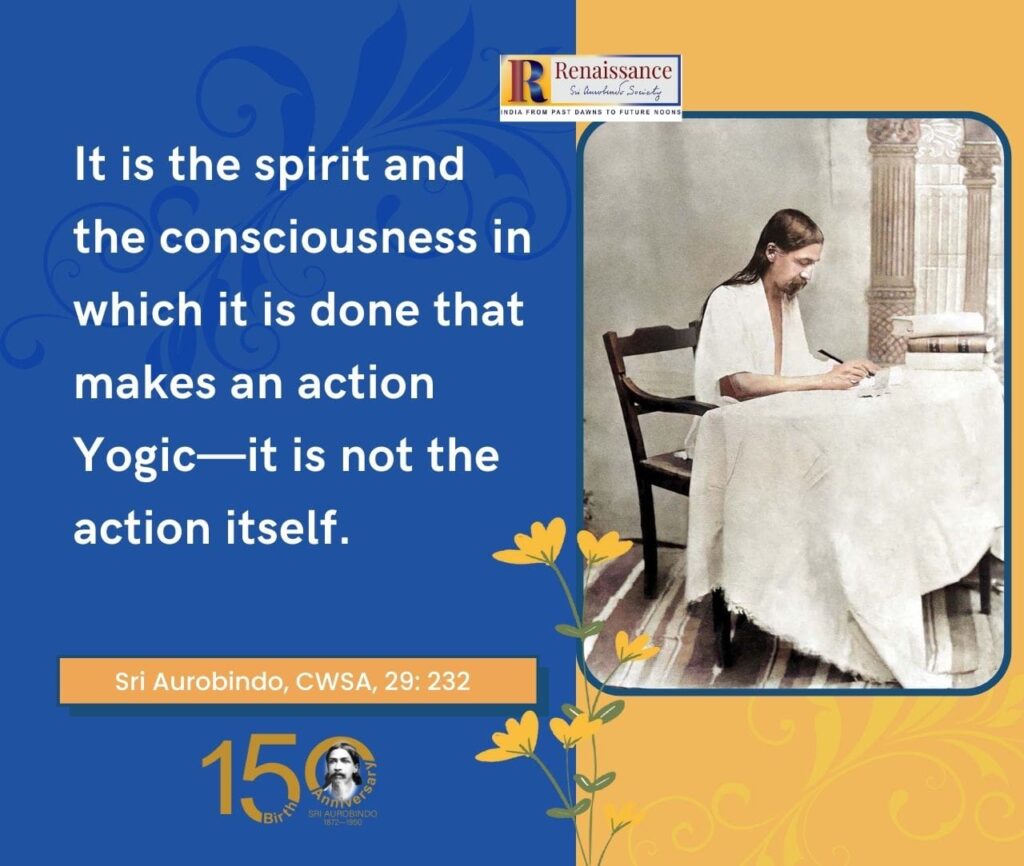
🌸🌸🌸
Each person does work with different inner attitude and aspiration. The same work can be done by different person with a different inner attitude which can be categorised into following five stages of work. Here each stage consists of the greatest essence from the previous stage.
STAGE 1: Work as Livelihood
This is the stage when you work to earn money, to make ends meet, to take care of one’s own and family needs. Often this grows into working for money, name, fame, power etc. Here we need not consider those degenerate forms, though many times even those degenerate forms could help one individualise and build one’s capacities before one can truly offer and be of use to the world.
STAGE 2: Work as Passion
In this stage, one works not merely to earn one’s livelihood, but out of a passion for what one likes and love to do. This is when one is coming alive through work. Be it shooting videos or dancing, the passion for that drives the individual. At this stage, one is not very conscious of how one’s passion is raising the consciousness or contributing to the societal well-being.
STAGE 3: Work as Social Responsibility
In work as social responsibility, one aspires to make a contribution to the community, the society, the environment, the humanity. One is not so much interested in discovering one’s own unique gifts and how to grow them. Rather the concern is more with what the society needs and how one can contribute toward that. One begins to feel responsible for the state of affairs in the world and wants to contribute to improve that.
STAGE 4: Work as Service
Subtly different from stage 3, here one’s concern is not only about a sense of social responsibility and social change, but more about cultivating a heart that wants to give, offer and serve the Divine. It is no longer about one’s own ideas of how the world can improve and how humanity can be better off, but about serving to manifest the Divine Will upon Earth.
For instance, from a social perspective, it may appear that building a hospital is a better cause and contributes to society. But perhaps in the Divine scale of things, something such as Rumi’s poetry may be more impactful in shifting consciousness, inspiring generations after generations to act from a deeper space. And that may perhaps even lead to tens of hospitals as a result!
STAGE 5: Work as Worship
In this stage, there is not just action on the outside, there is a vast universe of action on the inside. This is the action of one’s thought, inner voices, feelings, sensations, etc. And each little detail of being is an offering, an arādhana, a service to the Divine. It is a very high stage, and perhaps, we do not even know what it truly means.
All one can say is that herein, there is no longer any difference between the inner and the outer, the self and the society. All is one flow of a Universal action. One is only an instrument.
🌸🌸🌸
Read:
Sri Aurobindo on Work as Sadhana
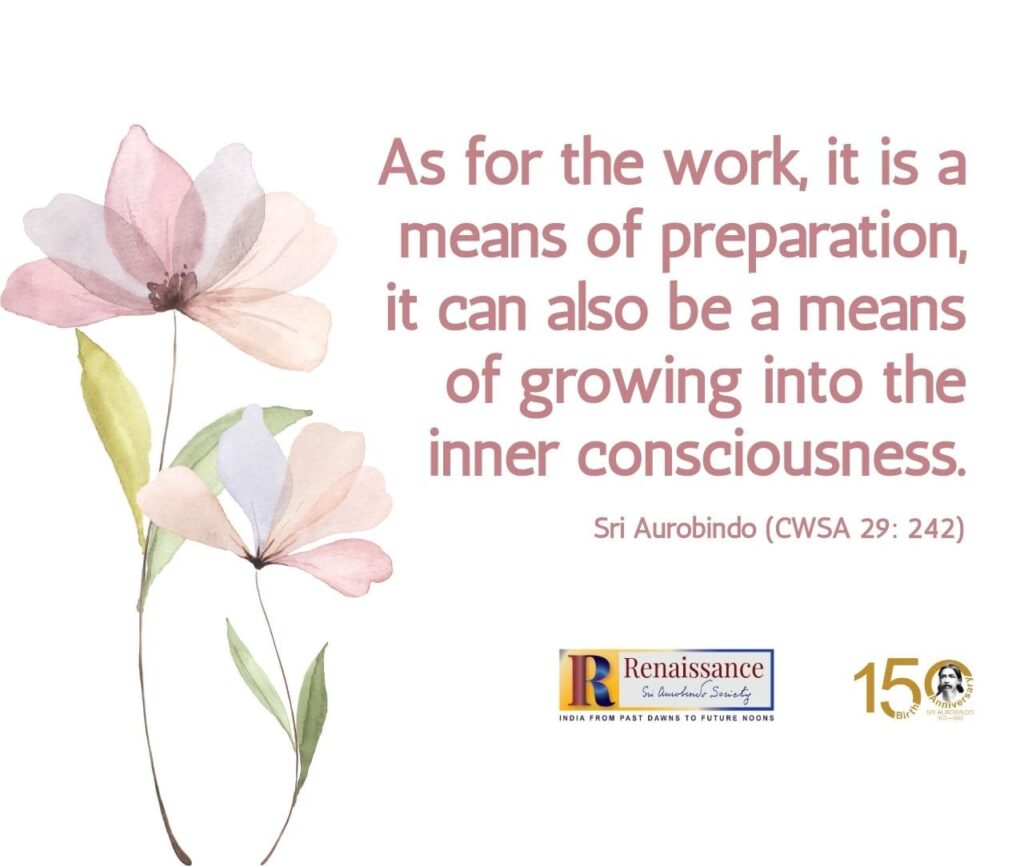
Twelve Indicators of Work as Worship
I list below twelve questions, reflecting upon which can help one become aware whether one is doing work as worship. These questions can also serve as real indicators to inspire us to keep moving towards this highest stage of work.
1. What is your work serving?
Ask yourself for whom or for what are you working. Is your work serving a degenerating old world, or helping birth a new world?
2. Who are you working for, moment to moment?
Even after you have chosen to work for noble causes, from moment to moment ask yourself — who is it that you are serving? Is it an ego or the Divine?
For instance, one may have chosen to join Auroville with an intention of serving the new creation, but one could still be serving a human ego, one’s vanity, one’s need for power etc. Perhaps it is better in that case to be in a corporate setting with an inner attitude of serving the Divine than to be outwardly committed to serving the Divine and inwardly serving little human demons.
Even in a disinterested work which consists in helping others, until one has learned to overcome the ego and its demands, until one can force it to keep calm and quiet in one corner, the ego reacts to everything that displeases it, starts an inner storm that rises to the surface and spoils all the work.
~ The Mother, CWM, Vol. 12, p. 355
3. From which inner space are you working?
What are your reasons for working? Often these are mixed. So really look within and ask yourself — what are different parts of my being seeking through work and action? Is there a desire? Is there a need for recognition? Be honest with yourself.
4. Does your work embody an aspiration for perfection?
Is your work embodying an inner and outer need for perfection? Are you fine tuning each little detail of your outer work with utmost concentration? Are you allowing it to perfect you within?
For example, you have to make a poster. Look at the font, the images, the text, and see if it embodies the highest of harmony and beauty that you are capable of manifesting.
5. What is your inner attitude and environment, moment to moment?
Is your inner environment calm, aspiring, receptive and offering? Or is it that you are having to make a lot of effort to work? In the former, there is a flow and joy. The latter is draining, and often within it is a strong sense of an inner attitude of doer-ship.
6. Are you really seeing work as a field of learning and growth?
If yes, then it will make you grow more youthful and wiser at the same time. When you take it as a learning process, nothing is mundane. Something as simple as writing administrative emails to people can become a field for learning about communication design, user engagement, purification of speech, inner concentration whilst in action etc. No work then is insignificant or mundane.
7. Are you working with a deep awareness and presence?
When one works with a deep awareness and presence, one does not have a need to hop from one thing to the other, but one finds all through going deep within one thing.
Let us take the example of food. Through food, if one goes deep enough with awareness, one can develop aesthetic sense, refine all senses, learn how to silently cook, begin to appreciate beauty, experience grace, learn how to setup a table, how to share, how to care. Just one thing, when done with awareness and care can open a universe.
Something as simple as brooming one’s room can become a means of a deep purification if done with deep awareness.
8. Are you using all parts of being in your work manifestations?
Are you only using the mind? Or are you also using your body? What about your energy and your drive? Are you able to bring in your work your aesthetic sense? Your emotional empathy, your communication power? Are you able to make your work a place to bring alive all parts of your being, for a natural integration and harmonisation between different parts of being.
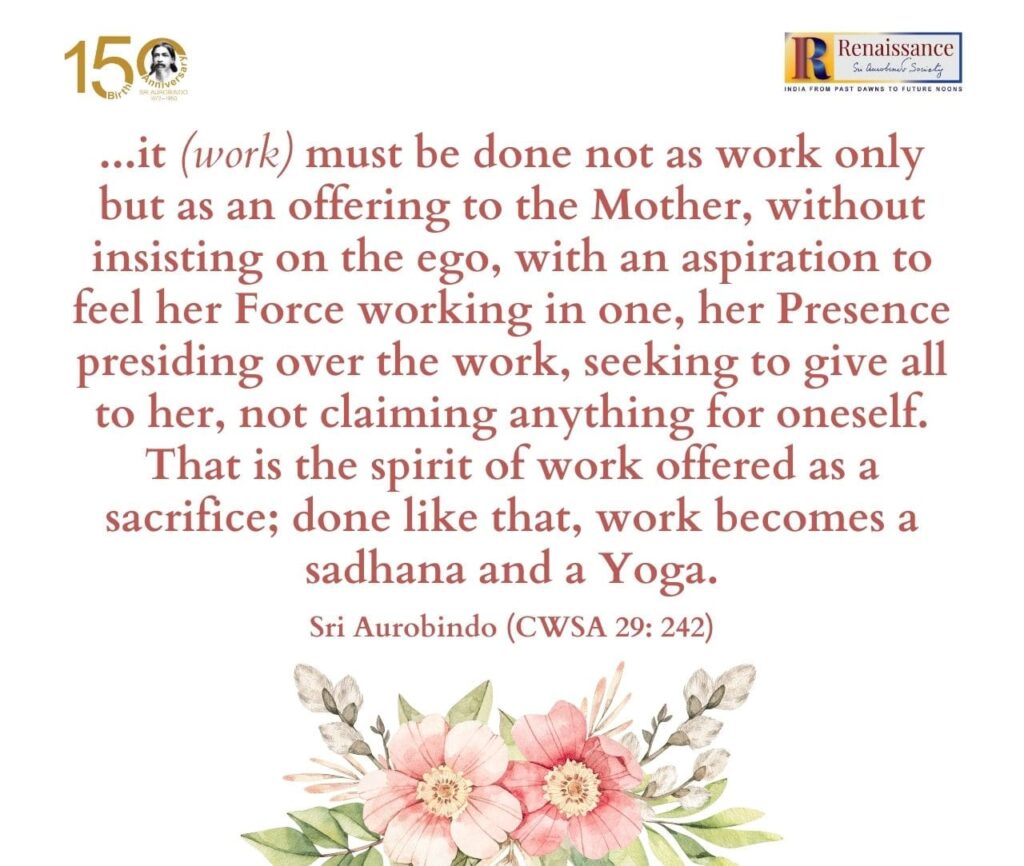
9. What is the vision of your work?
What is the inspiring vision guiding your life? Ask yourself — what is the inspiring vision that is propelling my work and actions and my thoughts and feelings?
10. Are you self-driven?
Tamas in our being makes us passive. Unless a push comes from outside we ordinarily do not move into action. Similarly, rajas in our being makes us act in an agitated and compulsive way.
A true self-drive is that which breaks through the passivity of the tamas and rises above rajas, and is moved by an inspired vision and power to make the true, the good and the beautiful manifest. Ask yourself whether you are proactively driving things.
For example, when you go to a meeting where everyone talks about inspiring ideas and ideals, pay attention to how much homework are you proactively willing to take. This can be a good indicator.
11. What do you do when challenges come at work?
Challenges at work are invariably, in every case, a great opportunity for you to process. Something is impelling you to expand and grow and move to the next orbit.
Notice carefully who do you blame when things are not working out, or when there is an anxiety, fear, helplessness inside of you. Also pay attention to the extent to which you are willing to scrap something totally in which you put months or even years of work, if the moment demands. If the challenges are propelling you to reinvent your work, are you willing to drop everything and start from scratch with the same enthusiasm?
12. What work are you doing? Is it the work you are meant to do? Is it helping you blossom into your full potential and taking you closer to your highest aspiration?
In yoga more than the ‘what’ of work, it is the ‘how’ of work which is more important. However, as your outer instruments get prepared and you become individualised, you begin to live your purpose and there is no longer a difference between the what and the how.
The work that you are doing embodies the purpose of your being here on Earth. This is an advanced stage, which requires sufficient preparation through the first 11 indicators.
As you grow in this stage, you are no longer the one doing work. You are simply an instrument through which the Universal Power and her great work is flowing.

About the Author
Divyanshi Chugh is an Aurovillian and co-founder of Purnam Center for Integrality. She designs and facilitates transformative experiential courses for adults based on the integral yoga psychology of The Mother and Sri Aurobindo. She has developed 30+ transformative courses so far and built an active community of more than 1000 student-practitioners. Divyanshi is passionate about India’s spiritual gift to the world, and through her work envisions reviving the spiritual lustre in all aspects of life.

Also Read:
Why Work and How to Work — Sri Aurobindo Guides
~ Design: Beloo Mehra and Raamkumar


